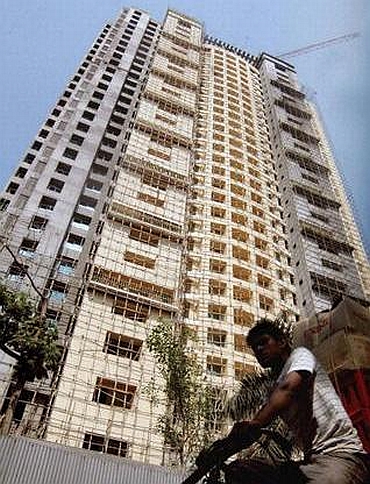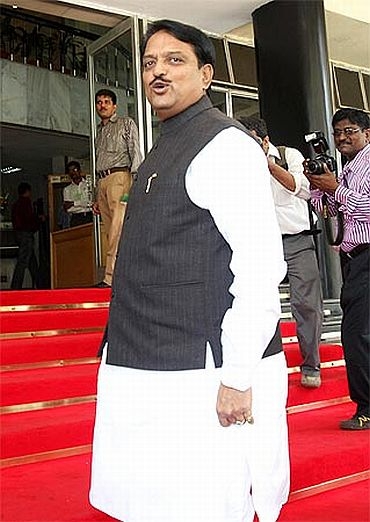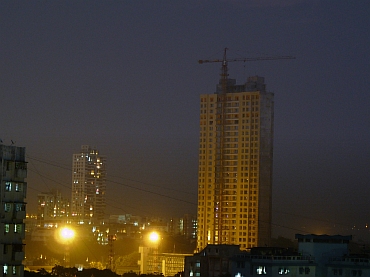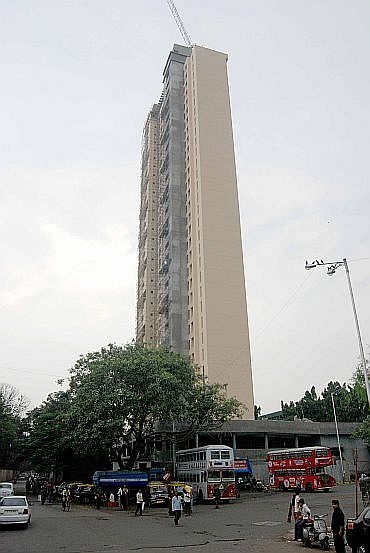
Vilasrao Deshmukh is alleged to have granted sops worth crores to the controversial Adarsh society, during his tenure as a chief minister of the state from 2003 to 2008.
Reportedly, it was Deshmukh who gave certain crucial clearances that enabled the society to go ahead and build 32 more flats. At the time, when these crucial clearances were granted Deshmukh controlled two key portfolios currently under the scanner -- the revenue department and the urban development department.
He is alleged to have used his discretionary powers to grant an additional floor space index of 2,669 square metres to the society. Moreover, he also allowed 700 square metres in the building to be used for commercial purposes.
It was Deshmukh who allegedly cleared the change in the use of land, which was reserved for a bus depot for residential purpose. All these clearances were granted on Coastal Regulation Zone land, without the mandatory clearance from the Union environment ministry.
The CBI officials are expected to question the former Maharashtra CM on all these allegations and record his statement, which will later be submitted to the Bombay high court.
...

In a 15-page affidavit, Deshmukh tactfully explains the government procedures and squarely states, "The chief minister of a state is not (and cannot be) required to personally scrutinise and/or cross verify and/or double check each and every proposal put up to him by the administration (which proposal has been reviewed and/or approved by large number of officers in the department). To expect this will make the functioning of the government impossible"
Click here to read the affidavit
At the outset Deshmukh explicitly mentions that, the events relate to a period of time ranging between six to 11 years ago. "I have little personal recollection of these events and the affidavit is based on the record made available by the government of Maharashtra and the commission," he said.
Explaining the procedure in detail on how government files pertaining to projects are cleared he stated, "Considering the complexity of matters; specialised knowledge required; and time constraints, the officers of the concerned department examine facts and/or issues, consider pros and cons, crystallise the matter or issues to be considered and include these in a note or proposal. The proposal is then reviewed by a hierarchy of officials who have particular expertise in the matter concerned and who are highly able and experienced administrators."
"As a part of the review process, these persons place their views/comments/ remarks/observations on the file. The file (with notings of the concerned officers) is then put up to the concerned minister. Where the proposal or file is to obtain concurrence of the chief minister, it is thereafter submitted to his office, where it is reviewed by his secretariat. It is only then, that the file is put up to the chief minister," he added.
He further said, "The file put up to the chief minister and/or minister therefore sets out the clear views or opinion formed by the administration on the note and/or the proposal. The chief minister and/or minister rely upon (and are expected to rely upon), the same when dealing with the file. This is particularly so, in cases where the file is (what is commonly known in administrative circles as) a 'positive file', (ie where there is positive recommendation and/or an absence of negative comments)."

"The revenue department relies and acts upon the report given by the collector. The chief minister's office comes into the picture because of the rules of business read with the government resolution (department of revenue and forest) dated May 31, 1993 require that cases relating to grant and alienation of land having a value of more than Rs 25 lakh "be submitted to the chief minister before the issue of orders."
Deshmukh further elaborated the government functioning and said that as elected representatives of the elected government, they are inundated with letters, requests and applications. Most of these letters are personally addressed to the chief minister or the minister. The normal procedure that is followed is to endorse there on, a "call for proposal", "please put up", "please examine" etc. What this really means is that the administration is expected to evaluate merits thereof and revert.

Whether land allotted to Adarsh Co-operative Housing Society Limited, belongs to the state government or any other person or organisation.
Deshmukh said, "The land allotted belonged to the government of Maharashtra since the time it has come into existence. The records maintained with the office of the collector of Mumbai clearly show that the said land belonged to the state government. The ownership of land was never an issue at any stage, as far as, I am concerned."
On the count whether the land in question or membership of the society was reserved for housing defence personnel or Kargil war heroes?
He said, "There was no reservation on the said land for housing of defence personnel or Kargil war heroes either under the development plan for Greater Mumbai or under any of the policies of the state government. He further added that he was not concerned with the issue of reservation of society membership."

Whether any person who was not eligible to become member of the society, was approved and made a member of the society. If so, who.
Deshmukh washed his hands off the entire membership procedure. He however agreed that he did make an exception in case of top retired army officials -- former military chiefs General N C Vij and General Deepak Kapoor. "I approved the proposal to relax the domicile norms/conditions, in the case of General Vij and Kapoor. This decision was fully justified and fitting considering their eminence and their distinguished service to the nation," he said.